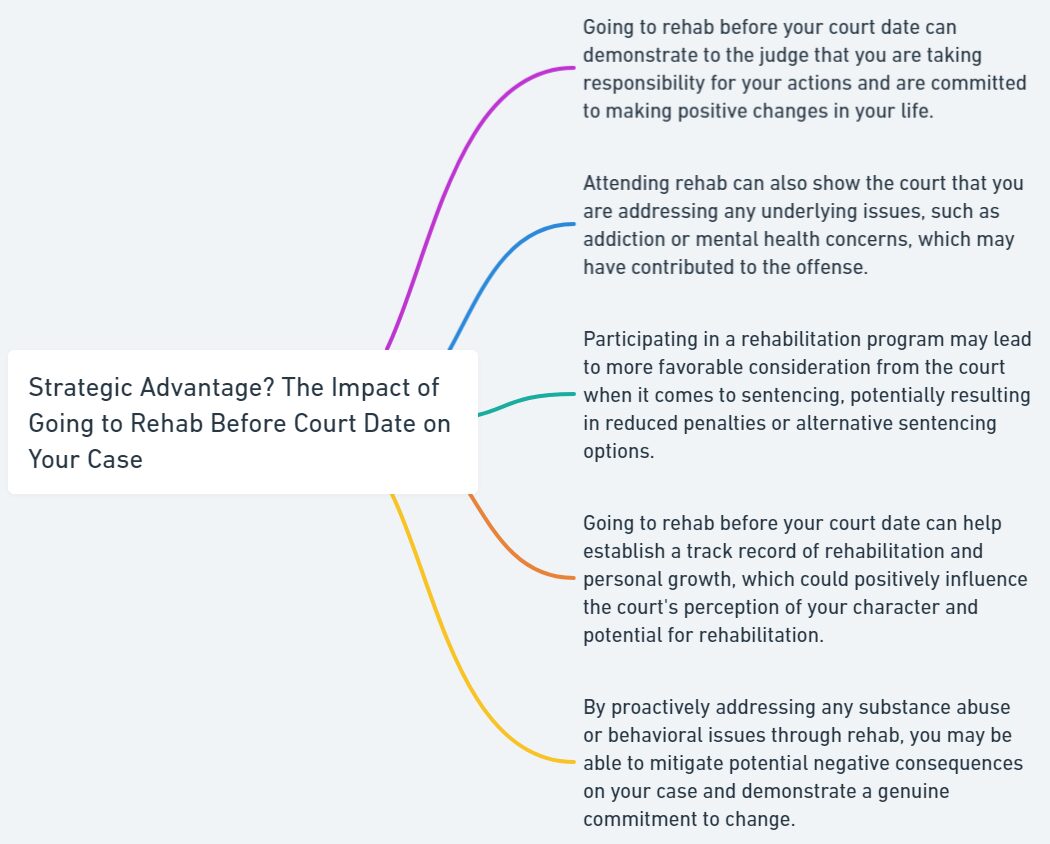Facing legal proceedings due to substance abuse issues may seem overwhelming, but it’s important to remember that there are ways to mitigate the consequences and improve your chances of a better outcome. One such approach is going to rehab before court date. In this blog post, we will explore the benefits of taking this step, the types of rehab facilities available, how to navigate the legal process while in rehab, and the financial considerations involved.
Key Takeaways
- Attending rehab prior to a court date can demonstrate responsibility and commitment, positively impacting legal outcomes.
- Navigating the legal process while in rehab is possible with the right support and consultation from a qualified professional.
- Financial considerations for rehab include insurance coverage, payment plans, and assistance programs.
The Benefits of Attending Rehab Before Court Date
Proactively seeking addiction treatment before your court date can have numerous benefits, including demonstrating responsibility and commitment to change, which can positively impact your legal outcomes. Voluntary participation in rehab sends a strong message to the court that you are dedicated to addressing your substance abuse issues and taking control of your life.
Attending rehab before a court date can also benefit those dealing with mental health problems related to addiction, as it shows a commitment to addressing these issues as well. Before making any decisions regarding drug and alcohol rehab in connection with pending charges, you should seek legal counsel, as your circumstances may differ.
Demonstrating Responsibility and Commitment
Obtaining written confirmation from the rehab facility and forwarding it to your attorney or the presiding judge is a practical way to demonstrate your active pursuit of treatment for drug or alcohol addiction. This proactive approach can serve as evidence that you are taking responsibility for your actions and are dedicated to achieving recovery from addiction, which may be particularly important if your insurance covers outpatient rehabilitation services.
Participation in group meetings, counseling sessions, and other rehab activities serves as a testament to your commitment to addressing your addiction and preventing further unlawful behaviors. Such commitment can impact your legal case positively, as the court may consider your dedication to recovery as a mitigating factor.

Positive Impact on Legal Outcomes
For those wondering whether going to rehab goes on your record and how it can impact the legal outcomes of your case, taking the initiative to attend rehab before your court date can lead to more favorable legal outcomes, such as reduced sentences or alternative punishments. This can have a significant impact on your life, potentially lessening the burden of legal consequences and allowing you to focus on rebuilding your life after rehab.
Rehab can also be beneficial in helping you prepare for court appearances by addressing your substance abuse issues. By participating in a rehab program, you demonstrate to the court your dedication to overcoming your addiction and enhancing your overall health. This can have a positive effect on your legal outcomes, as it reflects your commitment to recovery and personal development.
Additionally, rehab can provide you with the necessary skills and techniques to effectively manage the legal process and implement positive changes in your life.
Navigating the Legal Process While in Rehab

While it can be challenging to navigate the legal process while attending rehab, the right support can make it possible. Engaging in rehab before your court case may be seen favorably by the court, especially if you are facing pending charges related to substance abuse. Given the simultaneous occurrence of legal consequences and addiction treatment, consulting a qualified legal professional becomes essential when facing pending charges and seeking addiction treatment.
An attorney can provide guidance throughout the process of obtaining rehabilitation services while addressing the legal aspects of your case. Close collaboration with your attorney can help ensure adherence to court requirements, guide you through the complexities of addiction treatment, and position you for the best possible legal outcome.
Working with Your Attorney
Collaborating with an attorney is crucial for those attending rehab with pending charges, as they can help you navigate the legal process and advocate for the best possible outcome. An attorney can provide assistance in selecting an appropriate rehab center for their client with pending charges, offering guidance and advice based on their expertise in the legal system and the individual requirements of their client.
Furthermore, a lawyer can work with the District Attorney to arrange terms such as rescheduling court dates or suggesting alternative treatments that may be beneficial for their client. This collaborative approach can help ensure that your rehab experience is tailored to your unique needs and circumstances, maximizing your chances of a successful recovery and positive legal outcome.
Understanding Court Requirements
It is essential for individuals attending rehab with pending charges to understand the court requirements associated with their case. These may include:
- Attending the rehab facility for the duration specified by the judge
- Abstaining from drugs and alcohol
- Providing regular updates to court-appointed officials
- Abiding by the rules and regulations of the rehab program
- Engaging in therapy, counseling, and monitoring as directed by the court
Reporting your rehab attendance and progress to the court is an important aspect of fulfilling court requirements. This process may involve:
- Documenting attendance and progress in treatment, such as through aggregate attendance data
- General treatment progress measurements
- Reports prepared for the judge prior to the hearing to ensure accurate and timely information is provided.
It is crucial to maintain open communication with the court system and adhere to any court-mandated requirements during court proceedings to ensure a favorable legal outcome.
Types of Rehab Facilities: Inpatient vs. Outpatient

Understanding the differences between inpatient and outpatient treatment facilities is a key factor to consider when exploring rehab options. Rehab facilities for addiction recovery come in two main types: inpatient and outpatient treatment programs. Both play a vital role in providing structured and targeted support for individuals working to overcome their substance abuse. The choice between these two options depends on factors such as the severity and nature of the addiction, personal and financial circumstances, and any prior treatment experiences.
Inpatient treatment, also known as inpatient rehab, involves a residential stay at a rehabilitation center, offering 24-hour care and comprehensive therapy. Outpatient rehab, on the other hand, allows individuals to attend counseling sessions while managing their daily obligations at home. It provides more flexibility compared to other treatments. The choice between these two options will depend on the individual’s unique needs, circumstances, and the severity of their addiction.
Inpatient Rehab
Inpatient drug rehab is often a good choice for individuals with severe drug addiction problems. It offers:
- Medical supervision during the detoxification or withdrawal process, which can be especially helpful
- A residential stay at a rehab facility
- Comprehensive care and intensive therapy
- Support throughout the recovery journey
The essential elements of inpatient rehab treatment include:
- Counseling
- Medical care
- Addressing physical, emotional, and psychological aspects
- Personalized treatment plans
- Fostering camaraderie and personal connections among residents
These components work together to create a supportive environment that promotes healing and recovery, allowing individuals to focus on overcoming their addiction and rebuilding their lives.
Outpatient Rehab
Outpatient rehab is a more flexible treatment option that allows individuals to receive care while maintaining their daily responsibilities. Participants attend regularly scheduled therapy sessions and other treatments during the day. They come back home in the evening. This option offers greater flexibility for treatment. It can be beneficial to those with less severe addiction or for individuals who have already completed an inpatient program and need regular care..
Outpatient rehab programs like Lantana outpatient rehab offer a variety of therapies, such as cognitive-behavioral therapy (CBT), dialectical behavior therapy (DBT), and interpersonal psychotherapy (IPT). While outpatient treatment may not provide the same level of intensity as inpatient rehab, it can still be an effective option for many individuals seeking help for their addiction.
Court-Ordered Rehab Programs and Eligibility

For individuals facing legal charges related to substance abuse, court-ordered rehab programs serve as an alternative to incarceration within the criminal justice system. These programs aim to help individuals tackle their addiction issues and deter future criminal behavior, with drug courts playing a vital role in ensuring accountability and fostering successful recovery.
Eligibility for court-ordered rehab is contingent upon factors such as state laws, prior sentencing, and the nature of the charges. It is important to consult with a legal expert to determine your eligibility for court-ordered rehab and to understand the potential benefits of participating in such a program.
The Role of Drug Courts
Drug courts are responsible for overseeing court-ordered rehab programs, ensuring that individuals comply with treatment requirements and make progress towards recovery. They were first established in the late 1980s in response to the cycle of individuals facing repeated incarceration due to drug addiction. Today, drug courts can be found in all 50 states and are designed to assist participants in overcoming their substance use disorder and reduce the likelihood of future drug-related offenses.
The drug court’s responsibilities include:
- Monitoring drug testing and ensuring adherence to treatment plans
- Collaborating with treatment providers to develop and implement individualized treatment plans
- Providing support and resources to individuals in the rehab program
- Evaluating the effectiveness of the rehab program and making necessary adjustments
- Enforcing consequences for non-compliance with the rehab program requirements
Eligibility Factors
Determining eligibility for court-ordered rehab can be complex. It requires assessing a variety of factors, such as state laws, previous sentencing, and the nature of the charges. State laws and regulations can vary significantly, so it is essential to review the relevant laws of your specific state to understand the eligibility criteria.
Prior sentencing can also impact eligibility, with those who have no prior convictions being more likely to be eligible for court-ordered rehab than those with multiple convictions or felony charges. However, the eligibility criteria ultimately depend on the particulars of the case and the judge’s discretion.
Consulting with a legal expert can help you determine your eligibility for court-ordered rehab and navigate the complexities of the legal process.
Financial Considerations: Insurance and Payment Options
While paying for rehab can pose a significant concern for many individuals, it’s important to note that there are options available to mitigate the costs of treatment. Financial considerations for rehab include insurance coverage, payment plans, and assistance programs, with differences between private and court-ordered rehab centers.
In most cases, the individual seeking addiction treatment before their court case will be responsible for the cost of treatment. However, various insurance coverage and assistance programs can help individuals afford the costs associated with rehab, depending on their individual circumstances and the type of rehab center they choose.
Private vs. Court-Ordered Rehab Centers
Private rehab centers generally have higher costs than court-ordered rehab centers but may provide more tailored treatment options and amenities. These centers typically offer:
- Private rooms
- Luxury accommodations
- Tranquil surroundings
- Personalized meal plans
- Tailored treatment programs
On the other hand, court-ordered rehab centers are usually more affordable, yet they may have more limited treatment options. The average cost for residential addiction treatment in private rehab centers is approximately $42,500, while court-ordered rehab programs may cost around $5,000. It is important to weigh the benefits and costs of each type of rehab center when deciding on the best option for your needs.
Insurance Coverage and Assistance Programs
Insurance coverage and assistance programs vary depending on the type of rehab center and individual circumstances. The Affordable Care Act mandates that private insurance companies provide some form of substance abuse treatment coverage, though the extent of coverage may vary depending on the plan and policy.
Several assistance programs for rehab are not insurance-based, such as:
- The National Helpline provided by SAMHSA
- Government funding for drug and alcohol rehabilitation
- Nonprofit organizations and community services
- State-funded and low-income options
Availability and eligibility may vary depending on location and individual circumstances, so it is essential to explore all available options to help cover the costs of rehab treatment.
Relapse Prevention and Monitoring During Legal Proceedings

Relapse prevention is of utmost importance during legal proceedings in order to ensure sobriety. Consistent monitoring is vital for fulfilling court requirements. Regular drug testing, establishing support systems, and engaging in self-care strategies can be beneficial in helping individuals remain on track and avoid relapse while going through legal proceedings.
Adherence to these strategies can effectively showcase a person’s commitment to recovery and personal development, potentially influencing their legal outcomes positively. Maintaining sobriety with vigilance and dedication throughout the legal process is crucial as it holds great potential to influence the overall outcome of your case.
If you want to discover insights into success rates, relapse prevention, and long-term recovery outcomes for a well-rounded understanding of the effectiveness of drug rehabilitation programs, read our article on drug rehab success statistics.
Drug Testing and Accountability
Regular drug testing during treatment can ensure accountability and compliance with court-ordered rehab requirements, as well as monitor potential drug abuse. Drug testing techniques employed during addiction treatment include:
- Blood testing
- Questionnaires
- Urine testing
- Self-report screening instruments
The frequency of drug testing in rehab centers can vary, but it is generally conducted at least once a week or every 3 days in optimal circumstances. Adhering to drug testing requirements during legal proceedings is crucial to demonstrate your commitment to recovery and to comply with the court’s expectations.
Support Systems and Self-Care Strategies
To prevent relapse during legal proceedings, it’s vital to establish support systems and engage in self-care strategies. Support systems, such as therapy and peer support groups, can provide emotional support, guidance, and practical advice to those facing addiction and legal challenges.
Self-care strategies that can help individuals undergoing rehab avoid relapse include:
- Connecting with others
- Taking responsibility for your actions
- Practicing relapse prevention techniques
- Finding new ways of coping with challenges
- Addressing co-occurring disorders
By incorporating these support systems and self-care strategies into your daily life, you can maintain your sobriety and successfully navigate the legal process.
Summary
In conclusion, attending rehab before your court date can have numerous benefits, including demonstrating responsibility and commitment, positively impacting legal outcomes, and providing a solid foundation for long-term recovery. Navigating the legal process while in rehab can be challenging, but with the right support in place, it is possible to achieve a favorable outcome. Understanding the various types of rehab facilities, financial considerations, and the importance of relapse prevention and monitoring during legal proceedings can empower you to make informed decisions about your recovery journey and set you on the path to a healthier future.
Frequently Asked Questions
What is the purpose of going to rehab?
Attending a rehabilitation program can provide you with the safety and medical treatment necessary to successfully detox from drugs, including the help of medications to reduce withdrawal symptoms.
What are the benefits of attending rehab before a court date?
Attending rehab prior to a court date can demonstrate responsibility and commitment to positive change, influencing legal outcomes in your favor.
What is the difference between inpatient and outpatient rehab facilities?
Inpatient rehab provides 24/7 care and support with a residential stay, whereas outpatient rehab enables individuals to live at home while receiving treatment and continuing daily activities.
Are there financial assistance programs available to help cover the costs of rehab?
Yes, there are various financial assistance programs available to help cover the costs of rehab.
What is the role of drug courts in court-ordered rehab programs?
Drug courts play an important role in court-ordered rehab programs, ensuring compliance and progress of individuals in the program.



